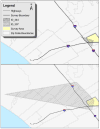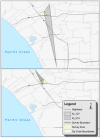An Alternative to Residential Neighborhoods: An Exploratory Study of how Activity Spaces and Perception of Neighborhood Social Processes relate to Maladaptive Parenting
- PMID: 27057130
- PMCID: PMC4820244
- DOI: 10.1007/s10566-015-9329-7
An Alternative to Residential Neighborhoods: An Exploratory Study of how Activity Spaces and Perception of Neighborhood Social Processes relate to Maladaptive Parenting
Abstract
Background: The environments where parents spend time, such as at work, at their child's school, or with friends and family, may exert a greater influence on their parenting behaviors than the residential neighborhoods where they live. These environments, termed activity spaces, provide individualized information about the where parents go, offering a more detailed understanding of the environmental risks and resources to which parents are exposed.
Objective: This study conducts a preliminary examination of how neighborhood context, social processes, and individual activity spaces are related to a variety of parenting practices.
Methods: Data were collected from 42 parents via door-to-door surveys in one neighborhood area. Survey participants provided information about punitive and non-punitive parenting practices, the locations where they conducted daily living activities, social supports, and neighborhood social processes. OLS regression procedures were used to examine covariates related to the size of parent activity spaces. Negative binomial models assessed how activity spaces were related to four punitive and five non-punitive parenting practices.
Results: With regards to size of parents' activity spaces, male caregivers and those with a local (within neighborhood) primary support member had larger activity spaces. Size of a parent's activity space is negatively related to use of punitive parenting, but generally not related to non-punitive parenting behaviors.
Conclusions: These findings suggest social workers should assess where parents spend their time and get socially isolated parents involved in activities that could result in less use of punitive parenting.
Keywords: activity spaces; harsh parenting; maladaptive parenting; neighborhood social processes; non-punitive parenting; punitive parenting.
Conflict of interest statement
Figures
References
-
- Brauer F, Castillo-Chávez C. Mathematical Models in Population Biology and Epidemiology. NY: Springer; 2001.
-
- Burton LM, Jarrett RL. In the mix, yet on the margins: The place of families in urban neighborhood and child development research. Journal of Marriage and the Family. 2000;62:1114–1135.
-
- Cohen S, Mermelstein R, Kamarack T, Hoberman H. Measuring the functional components of social support. In: Sarason IG, Sarason BR, editors. Social support: Theory, research, and application. Dordrecht, Netherlands: Martinus Nijhoff; 1985. pp. 73–94.
Grants and funding
LinkOut - more resources
Full Text Sources
Other Literature Sources


